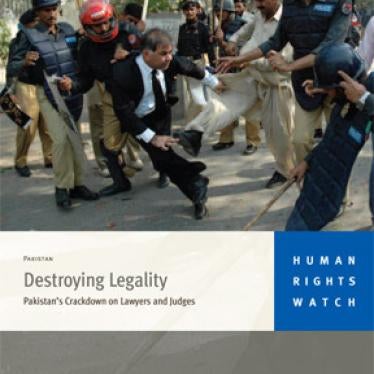(New York) - Scores of lawyers, judges and other government critics remain detained in Pakistan despite the lifting of the state of emergency on December 15, Human Rights Watch said today in a new report. President Pervez Musharraf’s dismantling of an independent judiciary and the crackdown on the vocal lawyers’ movement mean free and fair elections, scheduled for January 8, 2008, will be impossible.
The 84-page report, “Destroying Legality: Pakistan’s Crackdown on Lawyers and Judges,” presents eyewitness accounts of police violence, arbitrary arrests, and mistreatment of detained lawyers across Pakistan since November 3, 2007. The report details police beatings of lawyers peacefully protesting government policies from within the grounds of Pakistan’s high courts. It is the most detailed account to date of the November crackdown, showing how Musharraf used the emergency as an excuse to disempower the judiciary, the legal profession and civil society in the name of fighting terrorism and Islamic extremists.
“The lawyers’ movement had done more in eight months to challenge the pillars of military rule than the political opposition had done in eight years,” said Ali Dayan Hasan, South Asia researcher at Human Rights Watch. “Musharraf’s crackdown on legal institutions is a huge setback for human rights and the rule of law in Pakistan.”
Since March 9, 2007, the movement of lawyers and the growing independence of the nation’s judiciary had made genuine progress in putting Pakistan back on the path to democracy, Human Rights Watch said.
Under the revised constitution, unilaterally imposed by Musharraf, the government has new powers to disbar lawyers involved in peaceful anti-government activities, and the military can now try civilians for a wide range of offenses previously under the purview of the country’s judiciary, including charges as vague as causing “public mischief.”
Deposed Supreme Court Chief Justice Iftikhar Mohammad Chaudhry remains under strict house arrest along with his family and most of the other justices on the Supreme Court who refused to accept the suspension of the constitution on November 3. Leaders of the lawyers’ movement, including Supreme Court Bar Association President Aitzaz Ahsan, retired Justice Tariq Mehmood, and former Bar Council Vice Chairman Ali Ahmed Kurd, also remain under house arrest.
Restrictions on the media remain in force and the government has repeatedly warned it will not tolerate the “politics of agitation.”
Human Rights Watch noted that in such a repressive political environment, elections scheduled for January 8, 2008, cannot to be free or fair.
Given the well-documented history of election-rigging by the Pakistani military, the emergence of an independent judiciary provided the best hope for a free and fair election. A military-backed ruler who dispensed with the constitution in order to get rid of such a judiciary is unlikely to preside over an electoral exercise that could bring his political opponents to power.
“A genuine election campaign is impossible when the media remains muzzled, leaders of civil society remain under arrest, and the legitimate judiciary of the country has been deposed and replaced by hand-picked supporters of the government,” said Hasan.
Human Rights Watch faulted the United States and the United Kingdom, which consider Musharraf an indispensable ally in the “war on terror,” for failing to back formulaic statements of concern with concrete measures such as sanctions. Human Rights Watch urged both countries to press for the immediate release of all persons arbitrarily detained, the restoration of the judiciary, and a return to genuine constitutional rule.
“Foreign policy that tries to appease the Pakistani military at the expense of democracy is as dangerous as it is flawed,” said Hasan. “If the United States and the United Kingdom are genuinely interested in Pakistan’s political future and stability, they should focus on restoring the judiciary and lawyers to their status prior to November 3.”
Selected Testimony from “Destroying Legality”
“At the police station, the station house officer started beating me and telling me to shout slogans in support of Musharraf. I refused. So he punched me and kicked me and beat me with a stick and something else. Other police officers present also joined in… They kept taunting me and telling me to call [Chief Justice] Iftikhar Chaudhry for help and ordering me to shout slogans in support of Musharraf. They kept beating me like this until I passed out.”
—Hassan Tariq, District Bar Association executive committee member in Nawabshah, Sindh province, describing his arrest on November 8.
“From the Bar Rooms [lawyers’ lounges], the library, the study and the news room – lawyers were arrested from everywhere. And no one was arrested without being beaten up and humiliated. The senior lawyers – elderly individuals – were the worst affected. They were having breathing problems because the air was filled with teargas. Some of them were lying on the ground and were gasping for air. Even they were hauled up.”
—Abid Saqi, a lawyer describing the police raid on the Lahore High Court on November 5.







